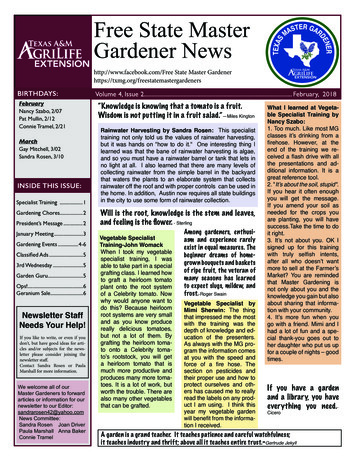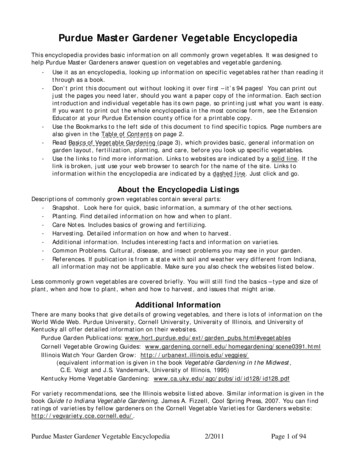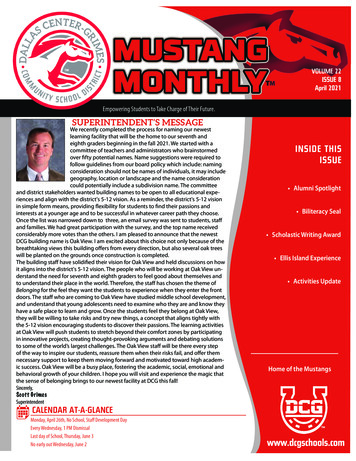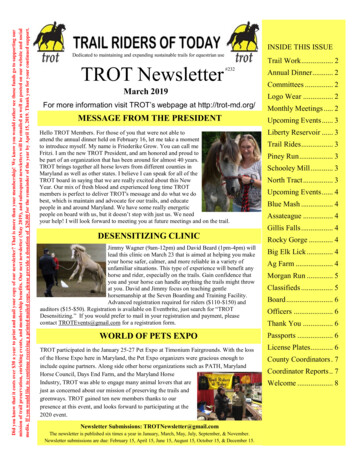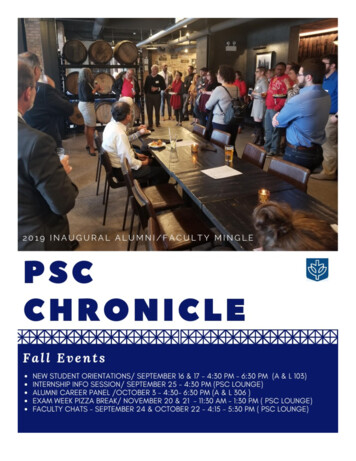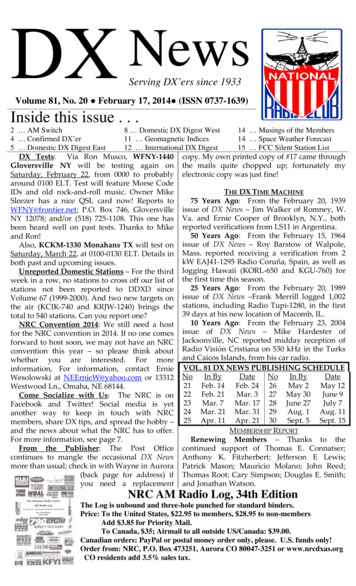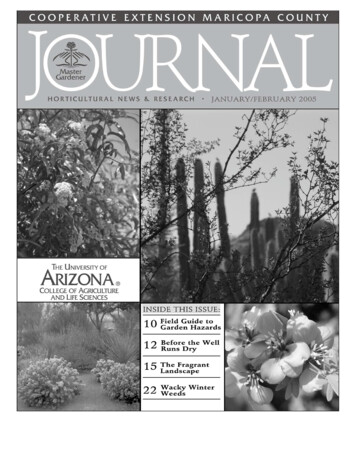
Transcription
INSIDE THIS ISSUEMaster Gardener JournalCalendar of Events3Things to Expect & Do7Plant Clinic: Field Guide to Garden Hazards for Your Pet10Ask A Master Gardener11Earth Friendly Gardening: Before the Well Runs Dry12Better Landscape Design: The Fragrant Landscape15Announcement: SMARTSCAPE Training17Special Report: Protecting Yourself from the Sun18A Bountiful Garden: Herb Gardening in the Desert19What You Need to Know: New to the Desert?21Botanical Basics: They’re Back: Those Wacky Winter Weeds22Real Gardens for Real People Tour23Master Gardener Citrus Clinics24Maricopa County Master Gardeners: Cultivating Plants, People & Communities since 1980 Master Gardener volunteersare trained by University of Arizona faculty and staff during a 17-week course. They provide educational leadership to thecommunity with research-based horticulture knowledge. Volunteers promote efficient use of water, fertilizers, andpesticides, and preservation of our desert environment.Creative Director: Janice Austin, janice.austin@asu.edu, Managing Editor: Jo Cook, jo@bloomingarizona.com;Copy Editors: Barbara Hamilton, Debora MoritzThe Master Gardener Journal, published 6 times a year by Maricopa Master Gardeners, is printed on recycled paper underthe direction of the Maricopa County Cooperative Extension Office, 4341 E. Broadway Rd., Phoenix, AZ 85040-8807. Homepage: ns: Available to the public for 18 for 6 issues. Rate for active Master Gardeners 15 or free online s/mgjournal.htm. Send name, mailing address, and a check payable toUniversity of Arizona. Mail to: Maricopa County Cooperative Extension, ATTN: MG Journal Subscriptions, 4341 E.Broadway Rd., Phoenix, AZ 85040-8807.Northwest Valley Satellite location: Property Owners & Residents Association (PORA) Office13815 Camino del Sol Blvd., Sun City West, AZ 85375. Phone 623-546-1672. Hours: 9 a.m.-1 p.m. Monday-Friday.East Valley Satellite location: East Mesa Multigenerational Center7550 E. Adobe Rd., Mesa, AZ 85207. Phone 480-985-0338. Hours: 9 a.m.-noon, Mondays and Thursdays.Northeast Valley Satellite location: Via Linda Senior Center10440 E. Via Linda, Scottsdale, AZ 85258. Phone 480-312-5810. Hours: 9 a.m.-4 p.m., Tuesdays and Thursdays.Urban Horticulture Staff:Lucy K. Bradley, Extension Agent, 602-470-8086 Ext.323, bradleyl@cals.arizona.eduTrade names given herein are supplied with the understanding that no discrimination is intended by the University ofArizona, and no endorsement or criticism of similar products is implied.Persons with a disability may request a reasonable accommodation, such as a sign language interpreter, at all eventssponsored by the University of Arizona. Call 602/470-8086. Requests should be made as early as possible to allow time toarrange the accommodation.Cover Photos: (clockwise from top left): Vauquelinia californica, Mountain StatesWholesale Nursery; Desert vignette, Jo Cook; Guaiacum coulteri, Mountain StatesWholesale Nursery: Ericameria larsifolia, Mountain States Wholesale Nursery.
PLANNING AHEADCalendar Of Eventsby Debora Moritz, Master GardenerJanuary 2004Garden Tours Daily beginning1/2 8:00 am - 8:00 pm Walkthrough the Garden at your ownpace and visit docents on thetrails and at designated“Sensation Stations” to learnabout the secrets and wonders ofour Sonoran desert. Hands-ondemonstrations byknowledgeable volunteers willreveal the remarkable adaptationsof plants, animals, and peopleliving in the desert. DesertBotanical Gardens.(480) 941-1225 www.dbg.org1/8, 1/15, 1/22, 1/29 1:00 pm Joindocent “Cactus Jack” and walk“back through time” when desertdwellers had to live off the landutilizing native plants for food,tools, and building materials. Thetour concludes with samplingsome of the desert’s delectablefoods. Desert Botanical Gardens(480) 941-1225 www.dbg.org1/8 Vegetable GardeningWorkshop 8 am-12:00 noon Geta head start on planning yourspring vegetable garden with thisinformative workshop taught byDBG horticulturist, Kirti Mathura.Learn about soil preparation,planting seasons and strategies,and great places to purchaseseeds. Take advantage of thisopportunity to get your gardengrowing right in the desert. Limit30. #WI04-500 Desert BotanicalGardens Requires AdvanceRegistration Member: 48 / NonMember: 60 (480) 941-1225www.dbg.org1/8 The Herbal Harvest: Tipsfrom the Professionals onHarvesting Preserving andCooking with Herbs 9:00 am –12:00 noon Arizona HerbAssociation sponsors this publicworkshop with experts MadaleneHill and Gwen Barclay. Theauthors will also sign their bookand lead a tour of the herbaldemonstration gardenRegistration required. Send checkpayable to Arizona HerbAssociation, P.O. Box 63101,Phoenix, AZ 85082-3101. Price 15 Non-members, Membersfree. Location: 4341 E. BroadwayRoad, Phoenix. Contact CathyCromell atccromell@ag.arizona.edu.(602) 470-8086 ext. 830.Website www.azherb.org1/8 Cacti and Succulents forSouthwestern Gardens 9:00 am12:00 noon Desert BotanicalGardens in partnership with Cityof Phoenix Water ConservationOffice (602) 261-8367 Workshop#WI04-08 Requires AdvanceRegistration 10 (480) 941-1225www.dbg.org1/10 – 4/1 Sammy’s SeedlingsPreschool 9:30 - 11:00 amNature is the teacher in thisprogram taught just forpreschoolers, led by ourenthusiastic and knowledgeableGarden educators. ‘DesertDiscovery Hikes’, age-appropriateactivities, stories, musical lessonsand puppet shows bring thedesert to life for you and yourpreschooler. Each week is full ofnew surprises, songs to sing, andfriends to make. Sessions arelimited to 15 children, ages 3-5(with an accompanying adult).Come join us. Call 480-941-1225to register, or 480-481-8123 formore information. DesertBotanical GardensMembers: 60 for 12 classsessions ( 40 for each additionalsibling)Non-members: 75 for 12 classsessions ( 50 for each additionalsibling)Choose one day per week, for 12week semester
Calendar of Events continued1/11 The Dirt on Compost6:00 - 8:30 pm Compost is the“black gold” essential tosuccessful gardening with manyherbs and vegetables. Discoverhow easy it is to produce yourown magical soil amendment andsave space in our landfills. DBGhorticulturist, Kirti Mathura, willshare all the composting basics.Limit 30. Desert BotanicalGardens Workshop #WI04-501Requires Advance RegistrationMembers: 30 /Non-Members: 38(480) 941-1225 www.dbg.org1/13 The Arizona Trail9:00 am-12:00 noon Join WendyHodgson, the Garden’s Directorof Herbarium, as she reports onthe exciting progress made on theArizona Trail Project. Wendy isworking to complete the flora ofthe trail areas and will share herstories and findings on this largescale endeavor. As this historictrail travels north, researchdiscoveries and adventuresabound. Limit 30. DesertBotanical Gardens Workshop#WI04-502Requires Advance RegistrationMembers: 24 /Non-Members: 30(480) 941-1225 www.dbg.org1/18 Contain Your Herbs6:00 – 9:00 pm Would you love tohave an herb garden, but don’thave the space? Maybe you wouldlike to add some herbal accents toa patio? A variety of herbs dowell in containers in our desertenvironment. DBG horticulturist,Kirti Mathura, will share some funideas to get you going. Limit 30.Desert Botanical GardensWorkshop #WI04-503.Requires Advance RegistrationMembers: 36 /Non-Members: 45(480) 941-1225 www.dbg.orgPage 4 January/February 20051/19 Seasonal ColorCombinations for YourLandscape6:30 -8:30 pm Desert BotanicalGardens in partnership with Cityof Phoenix Water ConservationOffice(602) 261-8367Workshop #WI04-20Requires Advance Registration 10 (480) 941-1225 www.dbg.org1/20 Landscape Plants forShade, Color, and Wildlife6:30 - 9:00 pm City of MesaLandscape Workshop. UtilitiesDepartment Building –Community Room, 640 NorthMesa Drive. Free, but advanceregistration is required. Call (480)644-4400, or e-mail your name,address, phone number andworkshop name toconservation.info@cityofmesa.org.Additional info, call(480) 644-33341/22 Master Gardener EastValley Citrus Clinic8:30 am – 12:00 noon 2558 EastLehi Rd., Mesa, AZ 85213-9711,Maricopa County. Topics: citruspests, disease, fertilization,irrigation, pruning, tasting andmore. Contact Travis Tonzi –tatonzi@cox.net, (480) 837-5888Registration required. 5 in advance, 8 at the door.Master Gardener Journal1/22 Herbal Entertaining 1:00 –4:00 pm Herbs are one of themost versatile plants we use everyday as food, seasoning,decoration, and even art. KayBenson leads this interactiveworkshop on how to grow, carefor, and utilize common herbs forentertaining. Use herbs such asbasil, tarragon, lemongrass, androsemary for decorating andcreating fun foods, crafts, andmore. Limit 15. Desert BotanicalGardens Workshop #WI04-25Requires Advance RegistrationMembers: 18 /Non-Members: 22(480) 941-1225 www.dbg.org1/22 Australia Day9:00 am – 12:00 noon PaulChambers, of Australian OutbackNursery in Tonopah, AZ, one ofArizona's best-known authoritieson eucalyptus and other species,will lead an 11 a.m. tour throughthe Arboretum. Boyce ThompsonArboretum (520) 689-5248http://Arboretum.ag.Arizona.edu/1/29 Propagation/Seed Starting9:00 am 12:00 noon DesertGarden Institute workshop taughtby Master Gardener, Pam Perry.Learn how to propagate andproperly start seeds. Bring yourown seeds from home or we willprovide some for you. Price: 20.Registration required. Location:4341 E. Broadway Road, Phoenix,AZ 85040, Maricopa County,Contact: Ainsley LaCour atdmauldin@cals.arizona.edu,(602) 470-8086.University of Arizona Cooperative Extension Maricopa County
Calendar of Events continuedFebruary 20051/29 Master Gardener NorthWest Valley Citrus Clinic8:30 am – 12:00 noon CitrusAgricultural Center, Waddell, AZ,Maricopa County. Topics: citruspests, disease, fertilization,irrigation, pruning, tasting andmore. Tickets 5 advance sale, 8at gate. Contact: Sam Pryfogle atRavensdad@cox.net,(623) 907-82501/29 Artistic Pruning of DesertTrees 9:00 am-12:00 noon Haveyou seen some of the pruningdone to our desert trees? ScottMcMahon, tree horticulturist andcertified arborist will teach anddemonstrate the correct pruningtechniques that will enhance theappearance and health of yourdesert trees. Limit 30.Desert Botanical GardensWorkshop #WI04-504Requires Advance RegistrationMembers: 36 /Non-Members: 60(480) 941-1225 www.dbg.orgGarden Tours Daily beginning2/1 8:00 am – 8:00 pm Walkthrough the Garden at your ownpace and visit docents on thetrails and at designated“Sensation Stations” to learnabout the secrets and wonders ofour Sonoran desert. Hands-ondemonstrations byknowledgeable volunteers willreveal the remarkable adaptationsof plants, animals, and peopleliving in the desert. DesertBotanical Gardens (480) 941-1225www.dbg.org2/5, 2/12, 2/19, 2/26 1 pm Joindocent “Cactus Jack” and walk“back through time” when desertdwellers had to live off the landutilizing native plants for food,tools, and building materials. Thetour concludes with samplingsome of the desert’s delectablefoods Desert Botanical Gardens(480) 941-1225 www.dbg.org1/29 Agaves for ArizonaGardens 9:00 am – 12:00 noonDesert Botanical Gardens, inpartnership with City of PhoenixWater Conservation Office(602) 261-8367Workshop #WI04-30Requires Advance Registration 10 (480) 941-1225 www.dbg.org1/30 Drip Irrigation1:00 – 4:00 pm ExperiencedMaster Gardener and DBG’s own“Cactus Jack” Blake will give anintroduction to drip irrigation. Hewill cover basic facts of botany,soils, and prepare you to installlow water use, efficient dripsystems for your desertlandscapes. He will introducedrip irrigation equipment and getyou started on your new system.Limit 30. Desert BotanicalGardensWorkshop #WI04-505Requires Advance RegistrationMembers: 36 / Non-Members: 60 (480) 941-1225 www.dbg.orgPage 5 January/February 20052/12 Project WET – TeacherTraining Workshop8:00 am - 4:30 pm Project WET(Water Education for Teachers) isall about WATER and the waysyou can teach related concepts inthe classroom. You will learn andtake part in activities thatemphasize water conservation.All participants receive the ProjectWET textbook and activity guide,along with other great take-awaymaterials. Teachers will receive acertificate for 8 hours ofcontinuing education uponcompletion. Limit 25. DesertBotanical Gardens Workshop#WI04-40Requires Advance RegistrationMembers: 8 /Non-Members: 10(480) 941-1225 www.dbg.org2/16 Landscape Plants of BajaCalifornia 6:30 pm - 8:30 pmDesert Botanical Gardens inpartnership with City of PhoenixWater Conservation Office (602)261-8367 Workshop #WI04-46Requires Advance Registration 10 (480) 941-1225 www.dbg.org2/19 Rose Gardening for Spring1:00 pm - 4:00 pm Desert GardenInstitute workshop taught byMaster Gardener, MarylouCoffman. Learn how to choose,plant and care for your roses.Price: 20. Registration required.Location: 4341 E. Broadway Road,Phoenix, AZ 85040, MaricopaCounty. Contact: Ainsley LaCourat dmauldin@cals.arizona.edu,(602) 470-8086.2/9 Attracting Butterflies andHummingbirds to DesertGardens 6:30 pm - 8:30 pmDesert Botanical Gardens, inpartnership with City of PhoenixWater Conservation Office(602) 261-8367 Workshop #WI0436 Requires Advance Registration 10 (480) 941-1225 www.dbg.orgMaster Gardener JournalUniversity of Arizona Cooperative Extension Maricopa County
Calendar of Events continued2/23 Color Your World –Landscaping for Color6:30 pm – 9:00 pm Does yourlandscape need a makeover?Perhaps just a tune up? This classwill show you how to havefabulous color in your landscapeyear-round. Learn what to plantfor an extended blooming seasonwith plants that thrive here in thevalley. You will learn moneysaving tips that will result inspectacular color in yourlandscape. Price: Free.Registration required. Restriction:None. Location: SoutheastRegional Library in Gilbert, AZ onthe southeast corner of Greenfieldand Guadalupe Roads, MaricopaCounty. Subject: LandscapePlants. Contact: Lisa Hemphill atlisahem@ci.gilbert.az.us,(480) 503-6098. Website:http://www.ci.gilbert.az.us/water2/28 Decorating with Butterflies6:00 - 8:30 pm What could bemore enchanting than butterfliesfluttering through your garden?Discover the best plants for yourlandscape to attract exquisiteadult butterflies, as well as thosethat allow them to complete theirlife cycle. DBG horticulturist, KirtiMathura, will give you tips onspecific plants and overall habitatssuitable for decorating yourgarden with butterflies. Limit 30.Desert Botanical Gardens,Workshop #WI04-508 RequiresAdvance Registration Members: 30 / Non-Members: 38(480) 941-1225 www.dbg.org2/24 Pests that Bug You6:00 – 9:00 pm Our yards are fullof interesting creatures, somegood and some bad. Learn howto identify common insects thatbother our desert landscapeplants. “Cactus Jack” Blake,Master Gardener, will discussways to help you control thesepests. Limit 30. Desert BotanicalGardens, Workshop #WI04-507Requires Advance RegistrationMembers: 36 /Non-Member:s 45(480) 941-1225 www.dbg.org2/26 Aloes for Arizona Gardens9:00 am – 12:00 noon DesertBotanical Gardens in partnershipwith City of Phoenix WaterConservation Office (602) 2618367 Workshop #WI04-56Requires Advance Registration 10 (480) 941-1225 www.dbg.orgPage 6 January/February 2005Master Gardener JournalUniversity of Arizona Cooperative Extension Maricopa County
THINGS TO EXPECT & DOFrom the Maricopa County Agriculture Extension web t-tips/t-tips.htmJanuaryTurfß Fertilize winter lawns monthly with ammonium nitrate, potassium nitrate or calcium nitrate. Follow instructionson package as needed to maintain good color (usually once every three weeks).ß Identify and correct problems with winter lawns quickly. Check our web site for more html/t-tips/cultural/wntr-lwn.htmVegetablesß Prepare garden soil for spring planting.ß Plant Seeds: Beets, bok choy, carrots, chard, collardgreens, lettuce (head and leaf), leek, mustard, greenonions, peas, potatoes, radishes, rutabagas, spinach andturnips.ß Plant Transplants: Artichokes (globe and Jerusalem),asparagus, broccoli, cabbage, Chinese cabbage,cauliflower, chard, kohlrabi, lettuce (head and leaf).Rosesß Prune roses.ß Transplant bare root roses.Fruit and Nut Treesß Prune deciduous fruit trees and grapes. Attend pruningdemonstrations hosted by Valley rose societies, gardenclubs, nurseries and the Cooperative Extension.ß Transplant bare root deciduous fruit trees. Select varietiesthat require less than 400 hours of chilling.Landscape Plantsß Protect plants from frost damage if the temperature isprojected to drop down to the 20's for more than an hour.ß Prune nonnative deciduous shade trees. Attend pruning demonstrations presented by Valley rose societies, gardenclubs, nurseries and the Cooperative Extension.ß Transplant bare root plants.ß Move living Christmas trees outside to a shaded, cool location until transplanted into permanent location.ß Water at least once a month, unless rains provide adequate moisture.ß Control weeds while they are young, tender, and their roots are manageable, or before they sprout. Be sure toremove before they set seed. Remove London Rocket and other weeds in the mustard family now to prevent largepopulations of False Chinch bugs in April.ß Winter watering schedules should be adjusted to about 1/3 of the summer frequency for deciduous and dormantplants, but water deeply each time. Winter lawns and growing flowers may require once to twice per weekwatering depending on the weather.HerbsPlant borage, catnip, chamomile, chives, cilantro/coriander, dill, fennel, feverfew, garlic chives, horehound, lavender,parsley, rosemary and thyme.Don't List . . .ß DO NOT prune frost sensitive plants, especially if they have been damaged by frost.ß DO NOT over water or over fertilize winter lawns as this will encourage rapid succulent growth that is vulnerableto fungal diseases.ß DO NOT water turf at night when the temperatures are coolest as this fosters the growth of fungal diseases.Continued on next page.
THINGS TO EXPECT & DOFrom the Maricopa County Agriculture Extension web t-tips/t-tips.htmFebruaryTurfß Winter lawns may require once to twice per week watering,depending on the weather.ß Fertilize winter lawns monthly with ammonium nitrate,potassium nitrate or calcium nitrate.ß Identify and correct problems with winter lawns quickly.Check our web site for more html/ttips/cultural/wntr-lwn.htmVegetablesß Prepare garden soil for spring planting.ß Plant Seeds: Beets, bok choy, carrots, chard, collard greens,corn, cucumbers, leaf lettuce, melons (cantaloupe,muskmelon, watermelon), mustard, green onions, peas,potatoes, radishes, spinach, summer squash, sunflowers and turnips.ß Plant Transplants: Artichokes (globe and Jerusalem), asparagus, chard, kohlrabi, lettuce, onion sets, peppers (bell,jalapeño) and tomatoes.Rosesß Finish pruning roses by the middle of the month.ß Transplant bare root rosesß Begin fertilizing established roses with granular fertilizers about the middle of the month. Remember to water theday before application and the day after.Fruit and Nut Treesß Finish pruning deciduous fruit trees and grapes by the middle of the month.ß Transplant bare root deciduous fruit trees. Select varieties that require less than 400 hours of chilling.ß Fertilize deciduous fruit trees with nitrogen when they leaf out.ß Prune frost sensitive citrus after it begins to leaf out with new spring growth.Landscape Plantsß Protect plants from frost damage if the temperature is projected to drop down to the 20's for more than an hour.ß Finish pruning nonnative deciduous shade trees, and grapes by the middle of the month.ß Transplant bare root plantsß Water at least once a month, unless rains provide adequate moisture.ß Control weeds while they are young, tender, and their roots are manageable, or before they sprout. Be sure toremove before
1/29 Artistic Pruning of Desert Trees 9:00 am-12:00 noon Have you seen some of the pruning done to our desert trees? Scott McMahon, tree horticulturist and certified arborist will teach and demonstrate the correct pruning techniques that will enhance the appearance and health of your desert
